Edition 1/March 2025 Doxycycline, a widely used tetracycline antibiotic, has gained attention for its potential role in post-exposure prophylaxis (PEP) to prevent bacterial sexually transmitted infections (STIs). Recent studies have explored its efficacy and the potential public health implications. While doxycycline PEP demonstrates promise in reducing STI incidence among high-risk populations, concerns regarding antibacterial resistance necessitate a balanced and cautious approach to its implementation. the Implications for Antibacterial Resistance DOXYCYCLINE AS POST-EXPOSURE PROPHYLAXIS and The Role of Doxycycline in Post-Exposure Prophylaxis for STIs INTRODUCTION Doxycycline PEP involves administering the antibiotic shortly after potential exposure to an STI pathogen, such as Chlamydia trachomatis or Treponema pallidum. Studies have shown that it significantly decreases STI rates, particularly for chlamydia and syphilis, in populations with high exposure risk. Doxycycline is one of the recommended treatment regimens for chlamydia and serves as an alternative treatment for syphilis in nonpregnant patients with severe penicillin allergy or when penicillin is unavailable. Although doxycycline is not currently recommended for gonorrhea treatment due to elevated antimicrobial resistance, it remains effective against many strains of Neisseria gonorrhoeae in the United States. The Centers for Disease Control and Prevention (CDC) released guidelines in 2024 outlining the clinical use of doxycycline PEP, emphasizing its targeted application for high-risk groups. The recommendations stress integrating doxycycline PEP with other preventive measures, such as consistent condom use and regular STI screenings, to optimise benefits while minimizing risks. Monitoring antibiotic resistance and potential side effects is a key aspect of these guidelines. The CDC specifies that doxycycline PEP is not intended for universal use but is instead tailored for individuals at elevated risk of STI exposure, including men who have sex with men (MSM) and transgender women with frequent STI occurrences. EFFECTIVENESS OF DOXYCYCLINE PEP IN OTHER POPULATIONS To date, doxycycline PEP has proven effective primarily among MSM and transgender women at increased risk for STIs. The CDC currently recommends counseling for these populations regarding its use. However, there is insufficient evidence to assess the balance of benefits and harms in other populations, including cisgender women. Further research is needed to evaluate its efficacy in these groups, and the CDC will update guidelines as additional data become available. ADDRESSING ANTIBACTERIAL RESISTANCE The increasing use of doxycycline for PEP raises concerns about the potential for antibiotic resistance. Widespread prophylactic use of antibiotics can exert selective pressure on bacterial populations, accelerating resistance development. For example, Neisseria gonorrhoeae has exhibited rising resistance to multiple antibiotics, including tetracyclines, which could undermine the long-term efficacy of doxycycline PEP. A 2025 article from MedPage Today underscores the need for vigilance in implementing doxycycline PEP. The piece discusses evidence linking prophylactic …/continued on page 3 The Golden Mortar 1/2025 1

1&3 The Role of Doxycycline in Post Exposure Prophylaxis STIs 4-5 SAAHIP 2025 Committee 6 Operational Research Day 3 Artefacts 5 Professional Indemnity 7 PSSA Book Department 20 - 21 SG Branch Elections & AGM 6-7 Opportunities for Pharmacists In HEOR and HTA 8 SAAPI Workshops Information 9 SAAPI Conference Information 9 - 11 AfriSummit 12 - 13 The New and Improved Trinity Pharmacy 14 - 15 Unemployment 15 - 16 FIP Basel Statement Workshop 16 SAACP Web Information 16 - 19 A Day in the life of a PCDT Pharmacist 19 2025 SAACP Committee Members The Golden Mortar 1/2025 21 - 22 Highlights of NonCommunicable Diseases on World Diabetes Day 2
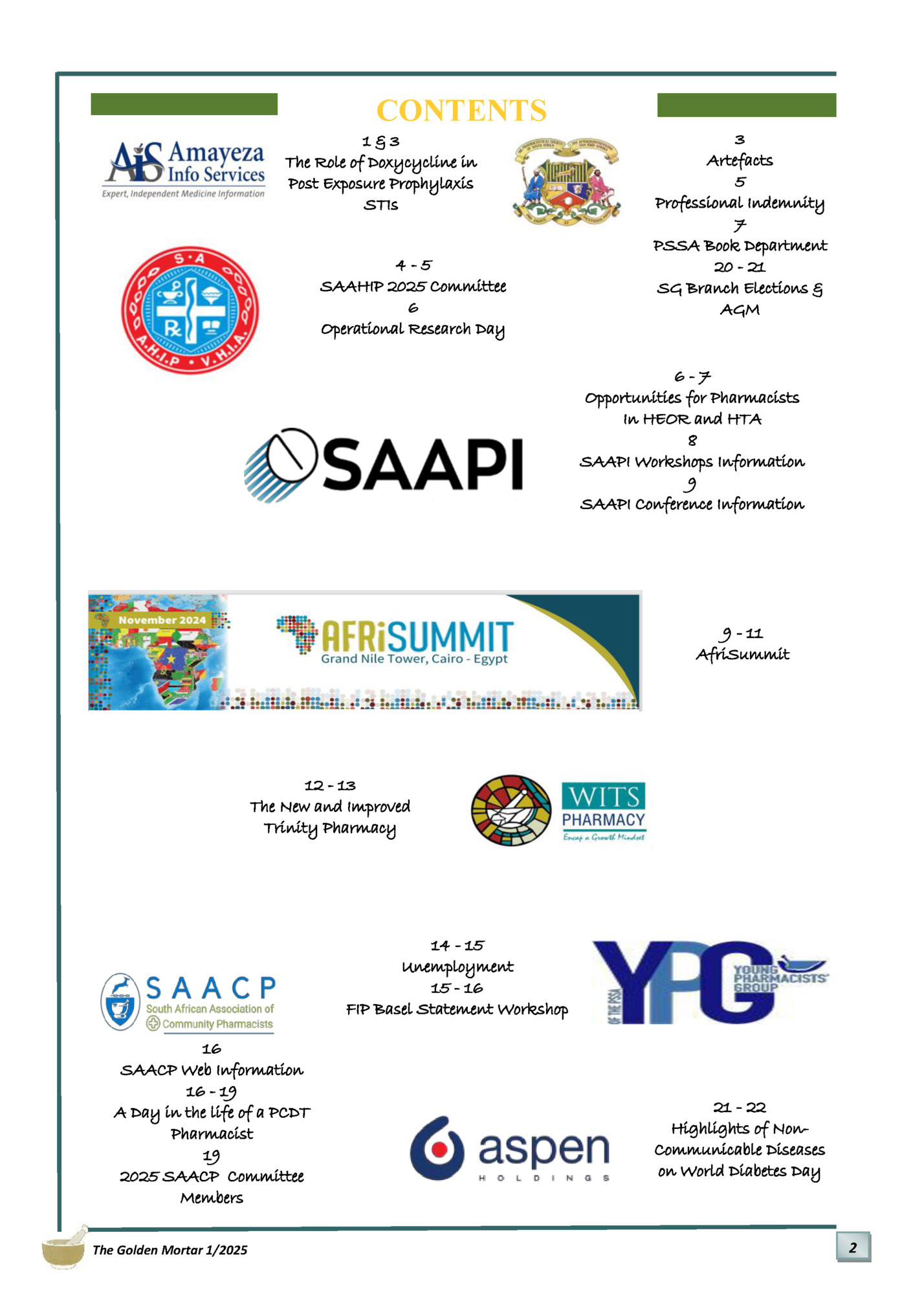
use to resistance trends and highlights the importance of balancing immediate public health benefits with the risks of reduced antibiotic efficacy in the future. Surveillance data and resistance pattern monitoring are emphasized as critical components of responsible doxycycline PEP deployment. BALANCING BENEFITS AND RISKS The integration of doxycycline PEP into public health strategies requires a nuanced approach. While it provides significant protective benefits for high-risk groups, the potential for resistance necessitates safeguards. Strategies to mitigate resistance include: 1. Targeted Use: Restricting doxycycline PEP to high-risk individuals, such as those with frequent STI exposure, can limit widespread antibiotic use. Studies indicate that targeted implementation has significantly reduced STI rates in specific populations. 2. Monitoring Resistance: Regular surveillance of bacterial resistance patterns in populations using doxycycline PEP is crucial for early detection and intervention. 3. Combination Approaches: Employing doxycycline PEP alongside other preventive measures, such as condom use and regular STI screenings, can reduce reliance on antibiotics. 4. Antibiotic Stewardship: Educating healthcare providers and patients about the risks of resistance and promoting judicious antibiotic use are critical components of a sustainable strategy. CONCLUSION Doxycycline PEP represents a promising tool for reducing bacterial STIs in high-risk populations. However, the potential for antibiotic resistance highlights the need for careful implementation. Policymakers and healthcare providers must weigh the benefits of immediate STI prevention against the long-term implications of resistance, ensuring that doxycycline PEP remains a viable option in the fight against STIs. Specific actions, such as enforcing antibiotic stewardship programs, promoting research into alternative preventive measures, and providing targeted education for high-risk communities, can support a balanced and sustainable approach. REFERENCE IS AVAILABLE UPON REQUEST R285 R165 R325 R95 The Golden Mortar 1/2025 R360 To start your very own collection please contact: Cecile @ 011 442 3615 ceciler@pssasg.co.za 3
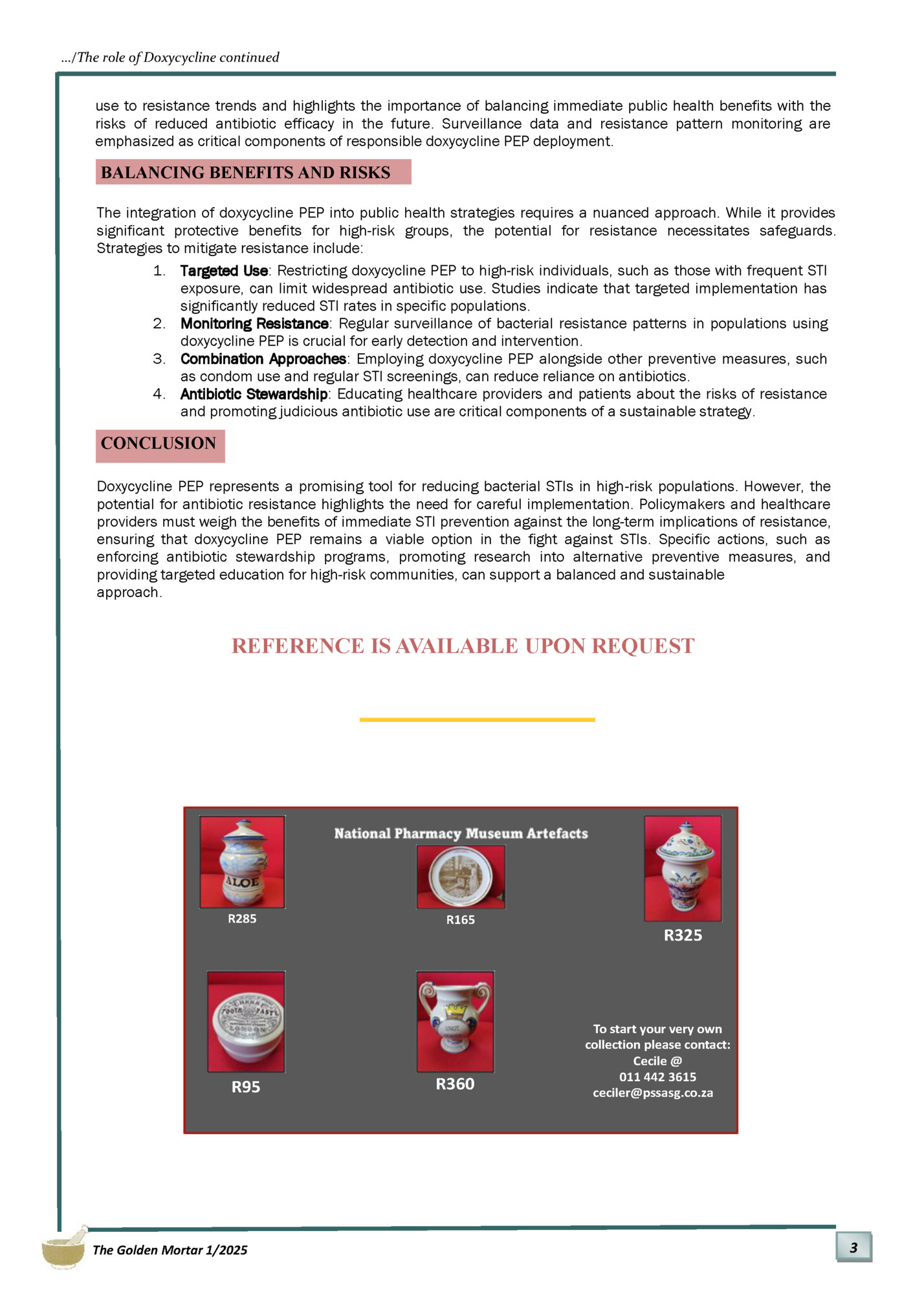
by Shaista Nabee Top row L - R: Kayakazi Hanise, Tshilidzi Shabangu, Devina Chetty, Sasha Badul, Solofelang Matshidiso, Priyal Laloo, Thanushya Pillaye, Kagiso Molefe, Liezl Nightingale & Jameelah Shaikjee Bottom row L - R: Shaista Nabee, Bandela Mgoqi & Rashmi Gosai The South African Association of Hospital and Institutional Pharmacists Southern Gauteng (SAAHIP SG) is excited to announce the election of its new committee during the Annual General Meeting (AGM) held on December 5th 2024. This marks the beginning of a new chapter of leadership and commitment to advancing the pharmacy profession. The AGM also featured an insightful Continuing Professional Development (CPD) session titled "The New Occupational Certificate: Pharmacist’s Assistants (Basic) and (Post Basic) – What to Expect," presented by Estelle Victor, the Executive Manager of SBUYs at SPAR. Estelle’s presentation offered valuable insights into the forthcoming changes and requirements for the Basic and Post Basic Pharmacist Assistant courses. Attendees gained a comprehensive understanding of the evolving expectations and standards for these programs, ensuring they are well-informed about the latest developments in training and certification. The elected committee is as follows: Rashmi Gosai - Chairperson Rashmi Gosai joined SAAHIP in 2017 as the branch Secretary and Treasurer. In 2021, she was elected as Branch Chair, a position she has held with distinction for four consecutive terms. An active member of the PSSA, she also plays a vital role within the PSSA Southern Gauteng branch. With 17 years of extensive experience as a pharmacist, Rashmi has worked across retail, hospital pharmacy, regulatory affairs, quality assurance, pharmacovigilance, and marketing. She further enhanced her expertise by completing an MBA, equipping her with strong leadership and strategic skills to drive innovation and excellence within the pharmacy profession. Passionate about her work, Rashmi is deeply committed to giving back to the profession. Outside her career, she is a proud mother of two, a talented classical dancer, a dedicated entrepreneur, and a staunch Hindu, exemplifying dedication in all aspects of life. …/continued on page 5 The Golden Mortar 1/2024 4
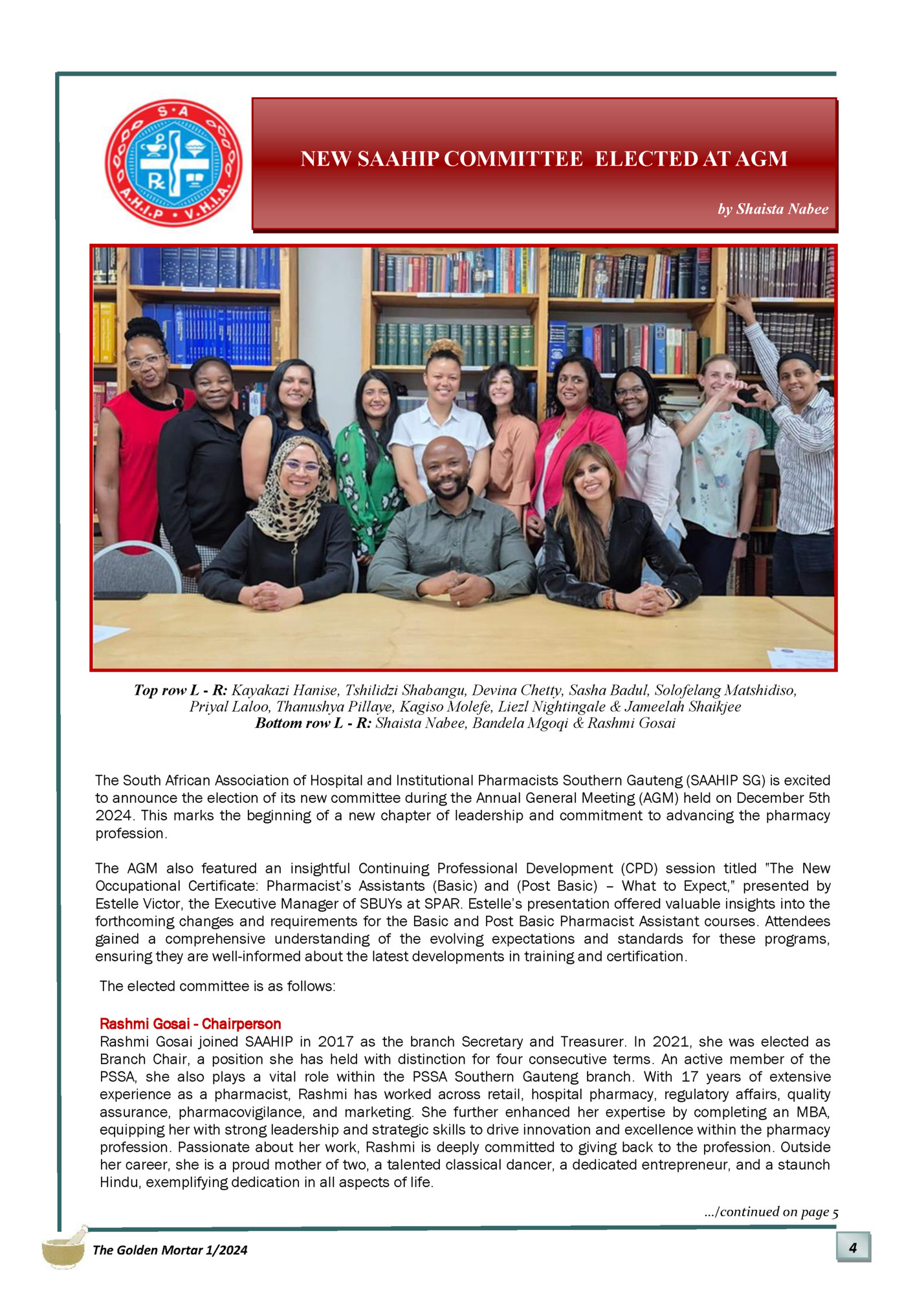
Shaista Nabee - Secretary and Treasurer Shaista Nabee is a dedicated and experienced pharmacist with a deep commitment to improving public health. With an extensive career in the sector, she has been serving as a pharmacy supervisor at Lenasia South District Hospital (formerly Lenasia South CHC) since from 2009 until 2021. Throughout her career, Shaista has played a pivotal role in the advancement of healthcare initiatives, contributing significantly to programs like the Central Chronic Medicines Dispensing and Distribution (CCMDD) program and the decentralization of MDR TB treatment. These contributions highlight her unwavering dedication to enhancing access to care and improving patient outcomes. Beyond her clinical work, Shaista is passionate about operational research and its potential to drive improvements in healthcare delivery. She currently continues to leverage her expertise in community care as a pharmacist at Stretford CHC, where she remains focused on providing high-quality, patient-centered care. Shaista's diverse experience and commitment to healthcare innovation make her a valuable asset to the healthcare community, consistently working towards bettering public health and expanding access to essential treatments. Committee Members 2024/2025 • Sasha Badul • Devina Chetty • Tabassum Chicktay • Priyal Laloo • Liezl Nightingale • Tshilidzi Shabangu • Jameelah Shaikjee • Bhadrashiela Valla Co-opted members • Kayakazi Hanise • Shoni Mulibaa • Thanushya Pillaye We look forward to the work of the newly elected committee as they continue to represent and support the hospital and institutional pharmacy community. Stay tuned for updates from SAAHIP as we embark on another year of collaboration and growth. The Golden Mortar 1/2025 5
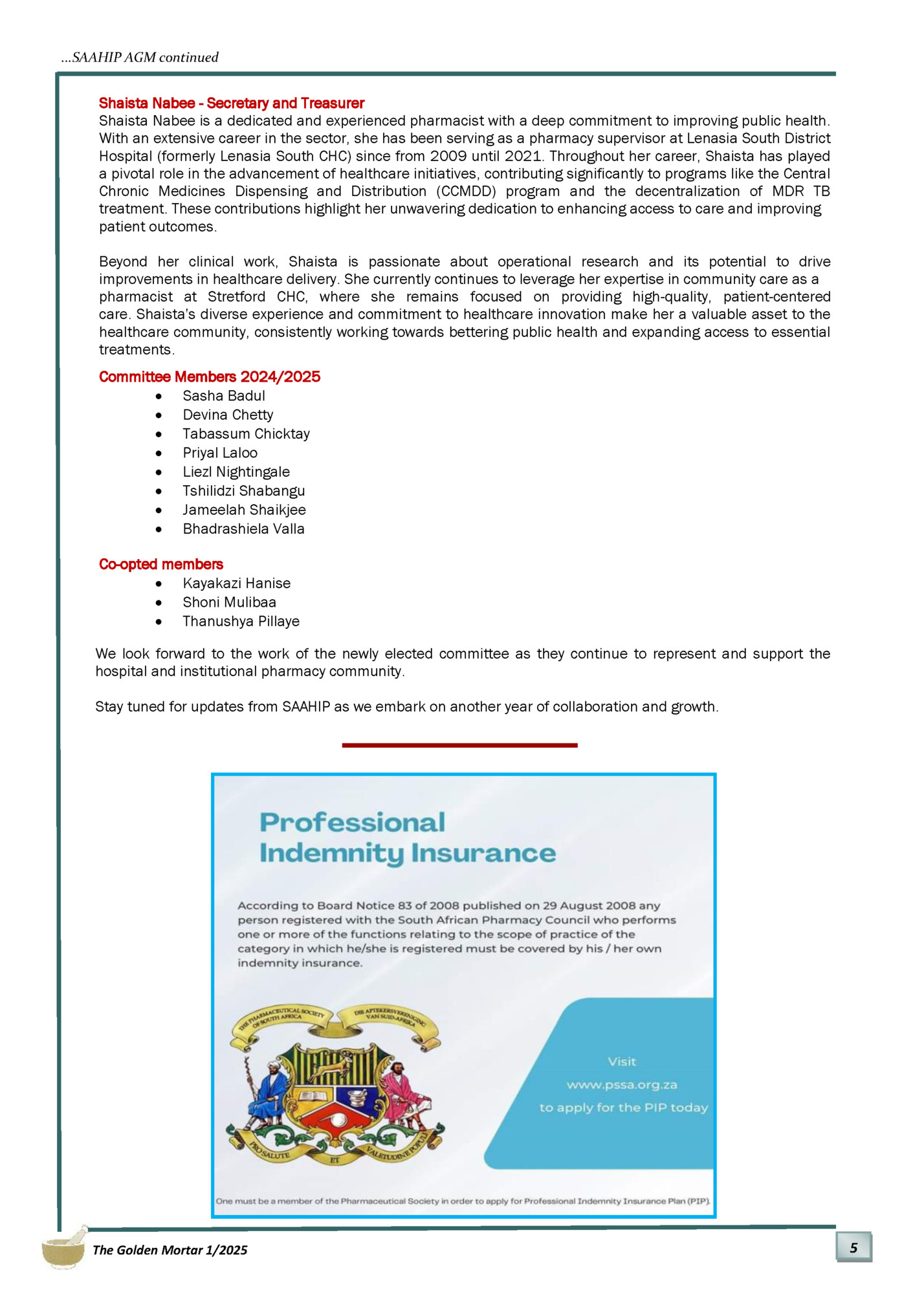
by Shaista Nabee The Gauteng Provincial Pharmaceutical Services hosted an Operational Research Day on November 1, 2024, marking the first such event in five years, with the last one held in 2019 before the COVID-19 pandemic. The Radisson Hotel and Convention Centre in Kempton Park was filled with excitement as pharmacists, pharmacy managers, community service pharmacists, and interns reconnected after a long time. I was honoured to be invited to attend this event, where the presentations were both insightful and relevant. It was inspiring to see the dedication behind the research and the impactful findings that emerged. Many key takeaways from the sessions could be applied in pharmacies to enhance pharmaceutical services. SAAHIP is especially proud to have had two of its members, T. Chicktay and S. Abel, among the presenters. We are extremely proud of both of them. Johannesburg Health District L - R: Farahnaaz Suliman, Shaista Nabee, Elifolet Bhembe, Tabassum Chicktay, Nelly Mokwele & Shailan Abel Opportunities for pharmacists in HEALTH ECONOMICS and OUTCOMES RESEARCH (HEOR) and HEALTH TECHNOLOGY ASSESSMENT (HTA) João L. Carapinha, Ph.D. Director: Syenza, As a young graduate stepping into the dynamic world of healthcare, you might be wondering about the various paths your pharmacy degree can take you. One exciting and impactful area is Health Economics and Outcomes Research (HEOR) and Health Technology Assessment (HTA). These fields are becoming increasingly important and offer a unique blend of economics, policy, and clinical practice. In this article, I’ll introduce you to HEOR and HTA, explore their relevance to pharmacy, and highlight the career opportunities they present. Understanding Health Economics and HTA Health Economics is a field that applies economic principles to healthcare, focusing on the efficient allocation of resources to improve health outcomes. It involves analyzing the costs and benefits of healthcare interventions, helping policymakers make informed decisions. Health Technology Assessment (HTA), on the other hand, is a multidisciplinary process that evaluates the social, economic, organizational, and ethical issues of a health intervention or health technology. HTA plays a crucial role in healthcare decision-making by providing evidence-based information to support policy and clinical decisions. Both Health Economics and HTA are essential in ensuring that healthcare systems deliver value for money, improve patient outcomes, and allocate resources effectively. They help determine which treatments should be funded, guide pricing and reimbursement decisions, and support the implementation of new technologies. HTA in South Africa;s National Health Insurance (NHI) NHI aims to provide universal health coverage, ensuring that all citizens in South Africa have access to essential healthcare services. HTA plays a vital role in supporting NHI implementation by evaluating the cost-effectiveness of treatments and technologies, ensuring that limited resources are used efficiently. …/continued on page 7 The Golden Mortar 1/2024 6
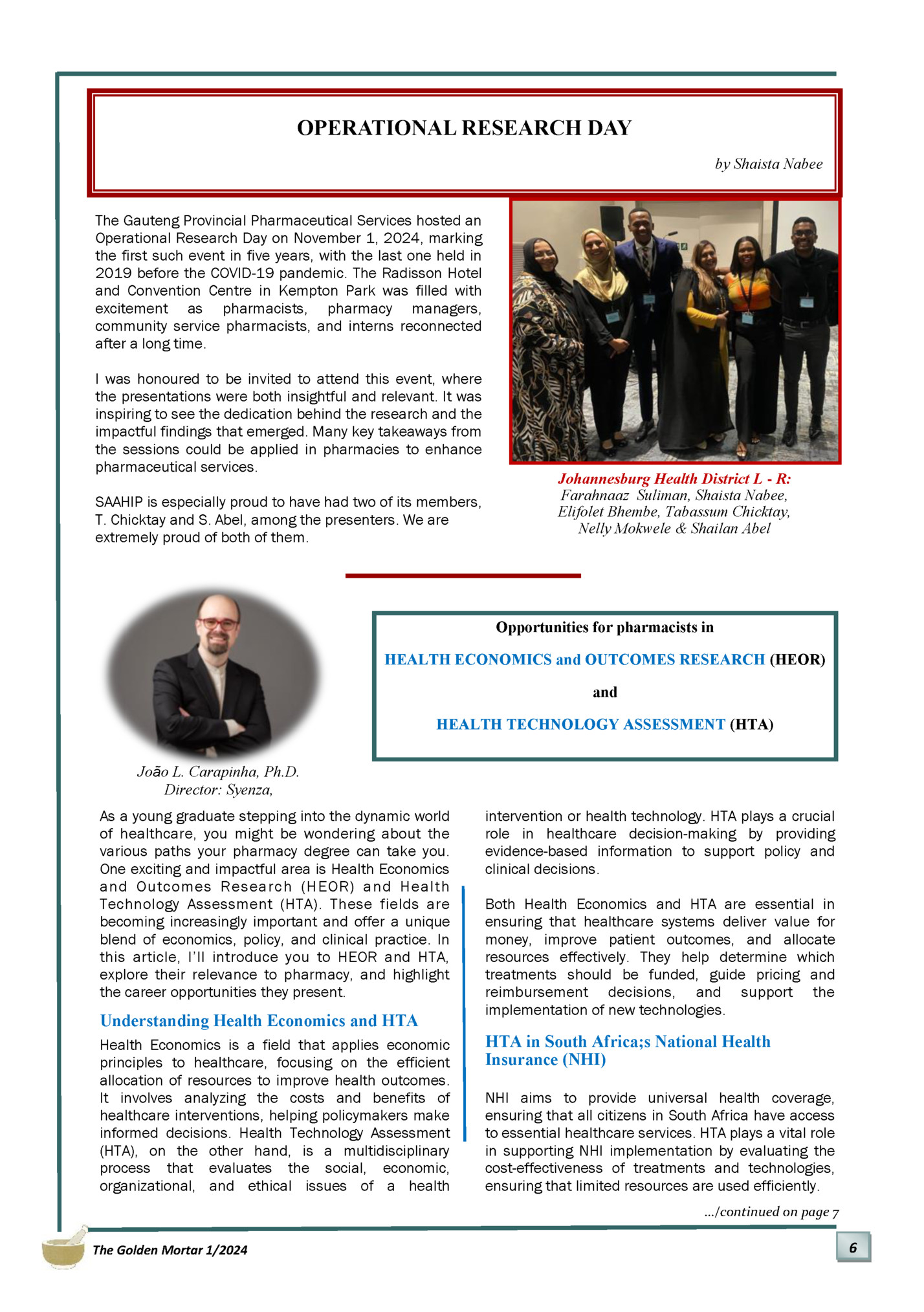
HTA helps address common questions about NHI, such as which treatments should be covered and how to prioritize healthcare spending. By providing evidence-based assessments, HTA supports the development of policies that maximize health benefits for the population while maintaining financial sustainability. Relevance of HEOR and HTA to Pharmacy Pharmacists are uniquely positioned to contribute to HEOR and HTA. Their expertise in medication management, patient care, and clinical outcomes makes pharmacists valuable contributors to these fields. HTA can be applied in pharmacy practice to evaluate the effectiveness and cost-effectiveness of medications, inform formulary decisions, and optimize patient care. For pharmacists, engaging in HTA-related roles offers numerous benefits. It allows them to expand their impact beyond individual patient care, influencing healthcare policy and improving population health outcomes. By participating in HTA, pharmacists can help ensure that patients receive the most effective and affordable treatments, ultimately enhancing the quality of care. Career Opportunities in HEOR and HTA There are diverse career opportunities for pharmacists in HEOR and HTA. Roles in market access, pricing, and reimbursement are particularly relevant, as they involve evaluating the value of new treatments and negotiating their inclusion in healthcare systems. These roles require strong analytical skills, a deep understanding of healthcare systems, and the ability to communicate complex information effectively. To pursue a career in HEOR and HTA, pharmacists should consider developing skills in data analysis, health policy, and economic evaluation. Educational resources, such as advanced degrees in health economics or public health, can provide a solid foundation. Also, engaging with professional societies and attending workshops or webinars can help build expertise and network with professionals in the field. Conclusion In conclusion, HEOR and HTA are exciting fields that offer pharmacists the opportunity to make a significant impact on healthcare systems and patient outcomes. By understanding the principles of HEOR and HTA, linking them to initiatives like NHI, and exploring career opportunities, you can position yourself at the forefront of healthcare innovation. I encourage you to explore the possibilities in HEOR and HTA, engage with educational resources, and consider how you can contribute to this vital area of healthcare. Whether you're interested in policy development, market access, or clinical evaluation, there is a place for you in this dynamic field. Embrace the challenge, and take the first step towards a rewarding career in HEOR and HTA. Syenza, https://syenza.com THE PSSA BOOK DEPARTMENT Do you know that the Book Department has a range of essential publications for pharmacists at preferential prices for members of the PSSA? From overseas publications such as Martindale, Merck Manual and Dorland’s Illustrated Medical Dictionary to local publications such as the South African Medicines Formulary (SAMF) and the Scheduled Substance Register. Ordering is this simple: Go to the PSSA website, www.pssa.org.za, click on the Hello, sign in button to order books at the discounted fee for members. Choose Book Store and complete online. Or Contact Dinette at PSSA National Office on (012) 470-9559 or at dinette@pssa.org.za The Golden Mortar 1/2025 7
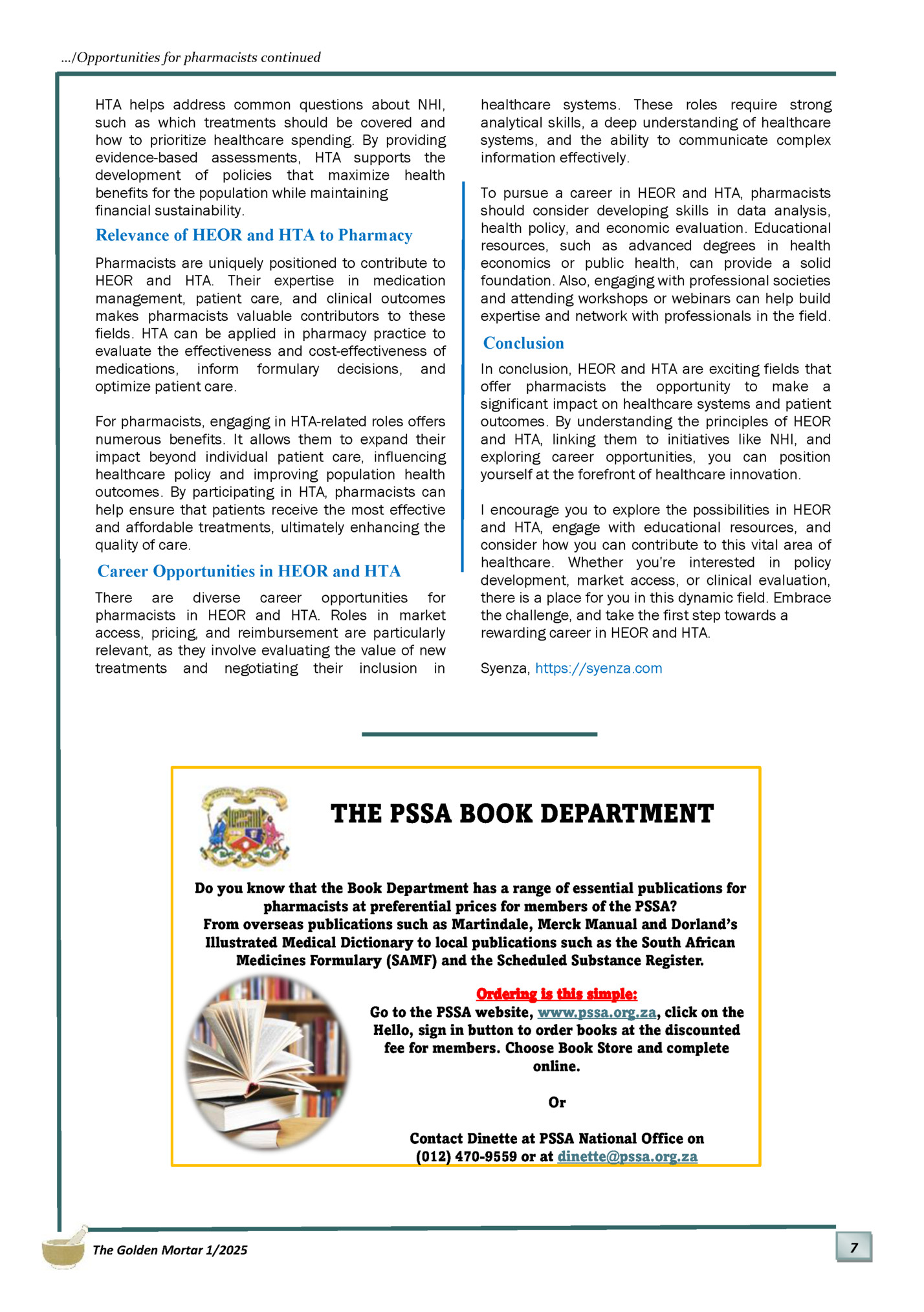
8
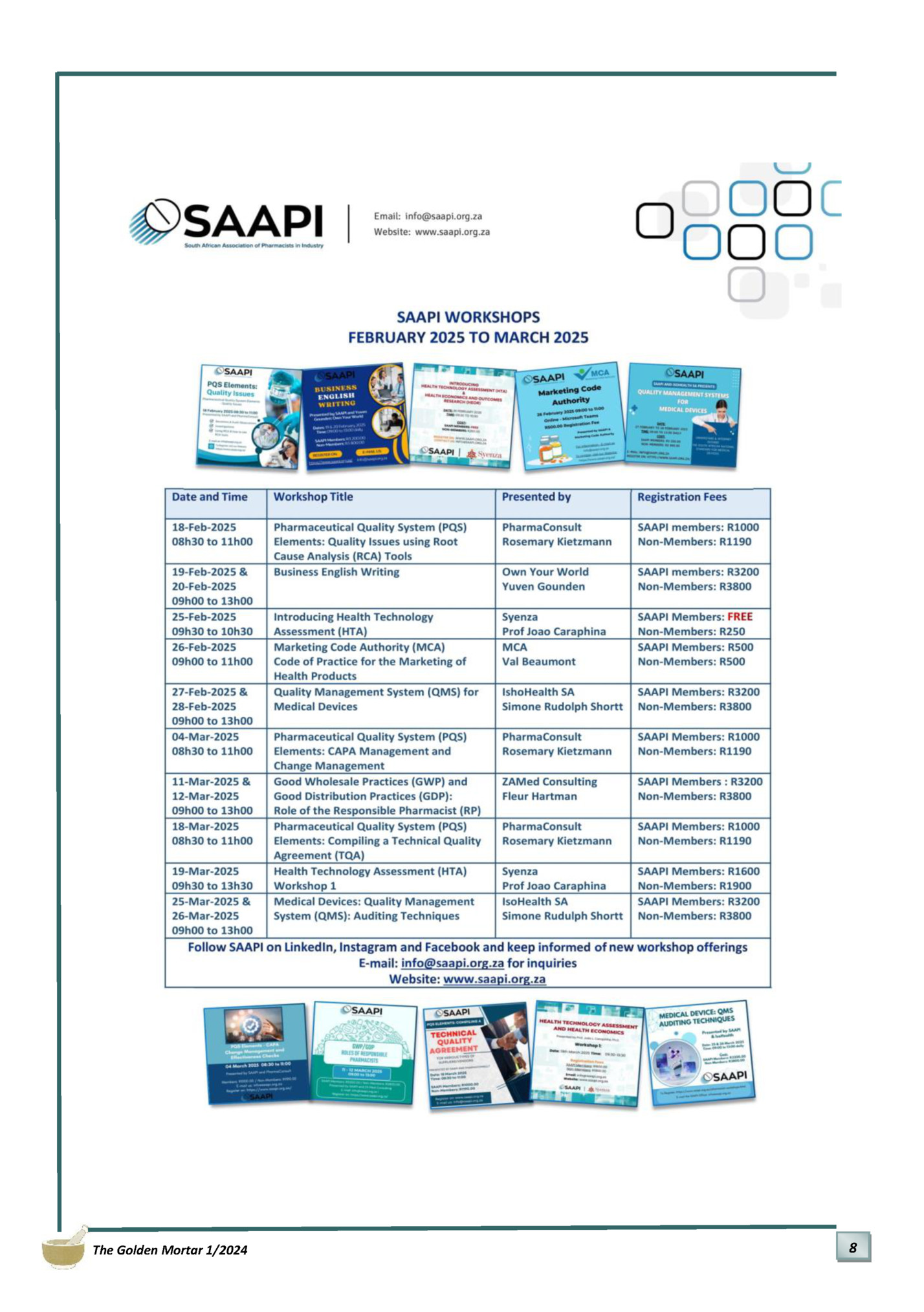
MDMSA, the Association of Medical Device Manufacturers South Africa, attended the AfriSummit 2024 in Cairo, Egypt, 3rd to 6th November 2024. It has been communicated that AfriSummit 2024 was a remarkable success, bringing together key stakeholders from across the pharmaceutical and healthcare industries. The diverse industry experts and NRA (national regulatory authority) speakers contributed to the summit's comprehensive content of knowledge and experience sharing, while the active participation from pharmaceutical and healthcare professionals highlighted the growing importance of Africa in the global healthcare landscape. The 3 main topics and feedback was around WHO maturity level recognition, Reliance for regulatory requirements such as product registration, establishment licensing with quality management system (QMS) such as MDSAP (The Medical Device Single Audit Program). MDSAP has a recognized Auditing Organization to conduct a single regulatory audit of a medical device manufacturer that satisfies the relevant requirements of the regulatory authorities participating in the program. Many of the African countries gave feedback about their WHO maturity level project. These WHO programs are intended to foster collaboration, innovation, and knowledge sharing. The Global Benchmarking Tool (GBT) represents the primary means by which the World Health Organization (WHO) objectively evaluates regulatory systems, as mandated by WHA Resolution 67.20 on Regulatory System Strengthening for medical products. The tool and benchmarking methodology enables WHO and regulatory authorities to: • Identify strengths and areas for improvements; The Golden Mortar 1/2025 …/continued on page 10 9
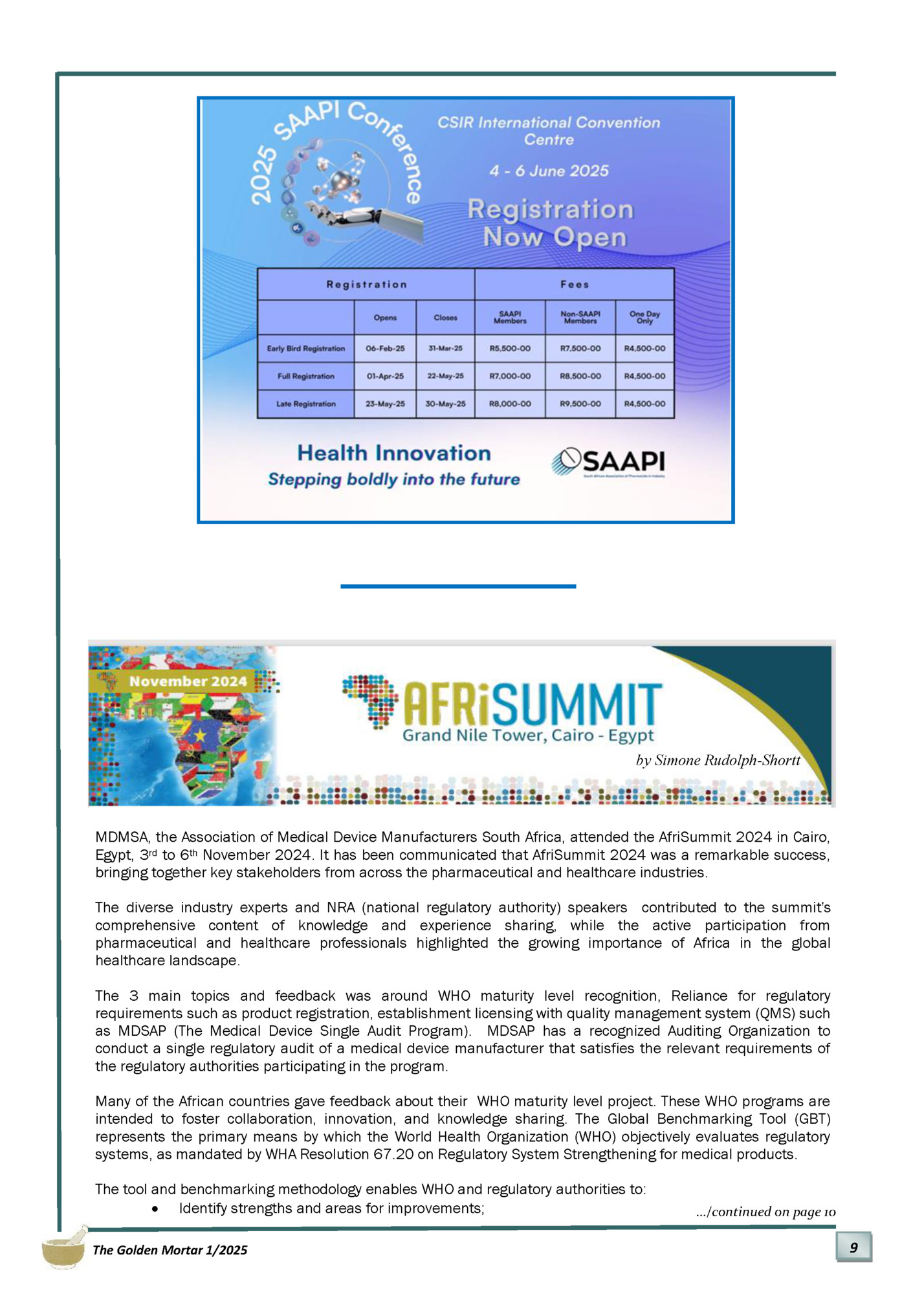
Fleepit Digital © 2021